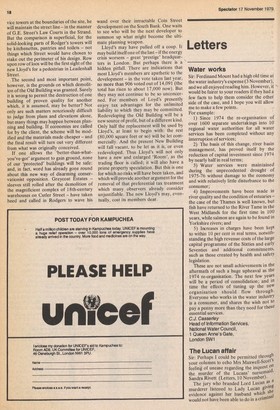Letters
Water works
Sir: Ferdinand Mount had a high old time at the water industry's expense (3 November); and we all enjoyed reading him. However, it N. would be fairer to your readers if they had a few facts to help them consider the other side of the case, and I hope you will allow me to make a few points.
For example: 1) Since 1974 the re-organisation of over 1600 separate undertakings into 10 regional water authorities for all water services has been completed without any interruption of services; 2) The basis of this change, river basin management, has proved itself by the reduction of capital investment since 1974 by nearly half in real terms; 3) Water services were maintained during the unprecedented drought of 1975-76 without damage to the economy and with relatively little disturbance to the consumer; 4) Improvements have been made in river quality and the condition of estuaries — the case of the Thames is well known, but fish have returned to the River Tame in the West Midlands for the first time in 100 years, while salmon are again to be found in Yorkshire rivers; and 5) Increases in charges have been kept to within 10 per cent in real terms, notwith standing the high revenue costs of the large capital programme of the Sixties and early Seventies and additional commitments, such as those created by health and safety legislation.
These are not small achievements in the aftermath of such a huge upheaval as the 1974 re-organisation. The next few years will be a period of consolidation; and in time the effects of tuning up the new organisation should flow through. Everyone who works in the water industrY is a consumer, and shares the wish not to pay a penny more than they need for these essential services.
C.J. Casserley Head of Information Services, National Water Council, 1 Queen Anne's Gate, London SW1






































 Previous page
Previous page